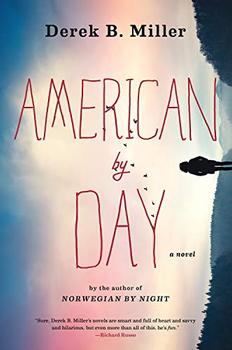Summary | Excerpt | Reviews | Beyond the book | Read-Alikes | Genres & Themes | Author Bio

In his latest crime novel, Derek B. Miller delivers what could have been a mosh pit style collision of cultures as a minuet — Norway versus America, Norwegian law enforcement philosophy versus American police practice, male versus female, white people versus people of color, religiosity versus secularism, and more. Thus, this is not a quick-read whodunnit but is, instead, a dance around the edges of a crime in three-quarter-time, paying due respect to the complexities of convention.
When forty-year-old Chief Inspector Sigrid Ødegård, one of Norway's top cops, comes to the United States in the summer of 2008 to look for her missing older brother Marcus, she's coming to a country in turmoil. The recent magnitude seven (or nine, depending on whom you ask) recession is pulling the financial rug out from under millions of Americans. It's a presidential election year. The first black man in history has real potential to become the so-called "leader of the free world." His opponent has selected as a running mate a political rookie. White Americans are still able to turn a blind eye to the nation's systemic racism. It's barely a year since over thirty people were killed in a shooting on a college campus. Gun ownership is escalating, as are mass shootings.
Sigrid's pre-visit impression of the United States (gleaned from binge watching American TV) is that it's a weird country. So it's a combination of this and jet lag that overwhelms her shortly after arriving in her brother's home town in upstate New York. Instead of finding the well-kept but unassuming home befitting a university adjunct professor of conservation, she's gob-smacked by the sight of an isolated, dilapidated hovel whose sole current inhabitant is a brash, outspoken prostitute. Impaired by the aforementioned jet lag, plus language issues and the totally unexpected news the hooker delivers, Sigrid can do little but repeat the woman's words. This prompts the woman to inquire whether Sigrid suffers from echolalia.
But the facts are the facts. Marcus seems to be a person of interest implicated in the suspicious defenestration death of Professor Lydia Jones, his black girlfriend. His hasty disappearance only confirms everyone's impression of complicity in a racially motivated crime, if not guilt. A visit to the local law enforcement office and a discussion with Jefferson County Sheriff Irving Wylie (during which the learned lawman inquires whether Sigrid has Asperger's Syndrome) confirms it.
And so the slow dance begins. There's Sigrid: Norwegian, career law enforcement, single, smart, ambitious, practical, analytical to a fault, accustomed to commanding respect via both her professional and personal stature. There's Irving: American, also smart with a master's degree in divinity from Loyola and currently in his second term as elected sheriff of a small county in the Adirondacks, divorced, not overly ambitious, more pragmatic than analytical, philosophical to a fault and square toe cowboy boot wearing for their "Everyman" effect. Irving believes he and Sigrid can work together to locate and bring in Marcus. Sigrid, mind you chockablock with preconceptions – some spot on, some not so much – doesn't think so.
Sigrid escapes the deputy assigned to shadow her. Irving apprehends her. They both are double or perhaps even triple crossed by that savvy hooker. Amid several meetings of their respective Norwegian and American, secular and Christian minds, Irving and Sigrid come to an uneasy peace. But nothing happens without each taking a gimlet look at their own culture, and their own inbred biases.
Because Lydia Jones's death has occurred on the heels of a grand jury acquitting a white police officer of fatally shooting her twelve-year-old black nephew, the words racially charged don't begin to describe local conditions. As a circumstance, this couldn't be more alien to Sigrid. It's also one that Sheriff Wylie feels he can safely sidestep because the white cop was not under his command. It will, however, not be ignored. As Jefferson County Officer Melinda Powell puts it, "If the grand jury had decided it was a bad shooting, it would mean we have a police force that can't tell the difference between right and wrong. And if they call it a clean shooting, it means we have a whole country that can't." Either way, she surmises, America's screwed.
Miller's characteristic wry sense of humor brings sharp relief to the vast number of interpretive shades that exist between descriptions of events and what they may mean. Although I agree with a few critics that the climax is a bit too cinematic, American by Day is so much more than the sum of its parts. And if you're reading carefully, it's clear that Miller enjoys poking both Americans and Norwegians in their cultural eye equally.
![]() This review was originally published in The BookBrowse Review in May 2018, and has been updated for the
April 2019 edition.
Click here to go to this issue.
This review was originally published in The BookBrowse Review in May 2018, and has been updated for the
April 2019 edition.
Click here to go to this issue.

If you liked American by Day, try these:

by Julia Dahl
Published 2015
In her riveting debut Invisible City, journalist Julia Dahl introduces a compelling new character in search of the truth about a murder and an understanding of her own heritage.

by S J. Gazan
Published 2014
Winner of the Danish Crime Novel of the Decade, S.J. Gazan's debut novel The Dinosaur Feather is a classic of Scandinavian noir, from its richly imagined and deeply flawed characters to its scintillating exploration of one of the most fascinating aspects of contemporary dinosaur and avian research.
What really knocks me out is a book that, when you're all done reading, you wish the author that wrote it was a ...
Click Here to find out who said this, as well as discovering other famous literary quotes!
Your guide toexceptional books
BookBrowse seeks out and recommends the best in contemporary fiction and nonfiction—books that not only engage and entertain but also deepen our understanding of ourselves and the world around us.